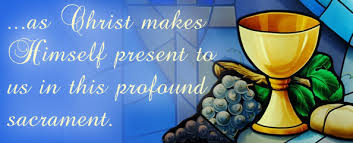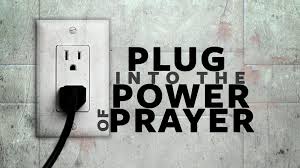Communion

1 Cor 11:24 And when he had given thanks, he brake it, and said, Take, eat: this is my body, which is broken for you: this do in remembrance of me.
25 After the same manner also he took the cup, when he had supped, saying, This cup is the new testament in my blood: this do ye, as oft as ye drink it, in remembrance of me.
26 For as often as ye eat this bread, and drink this cup, ye do shew the Lord’s death till he comes.
27 Wherefore whosoever shall eat this bread, and drink this cup of the Lord, unworthily, shall be guilty of the body and blood of the Lord.
28 But let a man examine himself, and so let him eat of that bread, and drink of that cup.
29 For him that eateth and drinketh unworthily, eateth and drinketh damnation to himself, not discerning the Lord’s body.
30 For this cause, many are weak and sickly among you, and many sleep.
Is 53:4 ¶ Surely he hath borne our griefs and carried our sorrows: yet we did esteem him stricken, smitten of God, and afflicted.
5 But he was wounded for our transgressions, he was bruised for our iniquities: the chastisement of our peace was upon him, and with his stripes, we are healed.
1 Cor 11:31 For if we would judge ourselves, we should not be judged.
So much teaching has been done on this divine ordinance of the church, that I am not going to spend much time on it, only to say this: Like everything in the new covenant with God, faith is what moves the hand of God.
Ro 14:23 And he that doubteth is damned if he eats because he eateth not of faith: for whatsoever is not of faith is sin.

Whether you take communion at home, with your family, and serve it as the high priest of your home, or it is served you by laypersons in the church, or anointed, consecrated clergy serve you the elements, mean little in the actual event, unless you meet with Jesus, through the Holy Spirit in the ceremony.
His body was broken, so that our body might be healed. When we break the bread, we remember what He did for us on the cross, and:
Is 53: 4 ¶ Surely he hath borne our griefs and carried our sorrows: yet we did esteem him stricken, smitten of God, and afflicted.
5 But he was wounded for our transgressions, he was bruised for our iniquities: the chastisement of our peace was upon him; and with his stripes, we are healed.
This is what the Holy Spirit, through the apostle Paul is explaining here, when we break the bread, recognizing, by faith, that Jesus body was broken for us, that our body might be healed.

Correctly understanding this, invokes the healing, living presence of God in the ceremony, not because of the mere bread, but through faith in remembering what that bread represents, the bread of life, Jesus, our ever-present help in time of need, our great physician, the ever-living one, risen from the dead, who ever bears witness to His Word and covenant with signs wonders and miracles!
Some fail to understand this, to receive him and His healing and:
1 Cor 11:29 For him that eateth and drinketh unworthily, eateth and drinketh damnation to himself, not discerning the Lord’s body.
The word damnation used here, means, ‘judgement’, and though the fear of the Lord is the beginning of wisdom, you need to understand that Jesus loves you. The judgment one might potentially receive at communion, is to simply stay sick, because they failed to believe. God is looking for ways to bless and heal and restore, as the heart of Jesus is always to seek and save the lost, not to condemn you.

Likewise, the wine, is symbolic of Jesus shed blood for us, it is the blood of our covenant with God almighty, and His blood never loses His power. When we partake of the wine, or fruit of the vine, again, God is looking for faith to be present, that we might appropriate, and receive from Him, all the blessings, and benefits that the blood of Jesus provides.

It is good to study what benefits Jesus blood has provided for you, so that when you take communion, you might receive all these benefits, by faith, every time you partake.
Here is a link to a short teaching on 12 benefits of the blood of Jesus, but I am sure there are more
Jesus shed blood opens heaven, and provides access to the very throne of God, for you, me, and any person who might come to Him, through His blood.
http://charliewhitlow.com/12-benefits-of-the-blood-of-jesus/
This is the power of communion, no dead liturgy, rather, a radical encounter, each time, with our living God!

A Testimony:
Believers dare not come to the Lord’s Table except with a repentant heart. “Whoever eats this bread or drinks this cup of the Lord in an unworthy manner,” as Paul puts it, “drinks judgment to himself.” That should be a sobering warning, especially when the apostle adds that because of this offense many have fallen ill or died. Any pastor who takes the Word of God seriously should never administer Communion without adequately warning partakers. Those who are unrepentant should flee the table rather than trivialize the sacred.
And God does not view this sacred act lightly. Pat Novak, a pastor in a nonsacramental denomination, discovered this when he was serving as a hospital chaplain intern just outside of Boston several years ago. Pat was making his rounds one summer morning when he was called to visit a patient admitted with an undiagnosed ailment. John, a man in his sixties, had not responded to any treatment; medical tests showed nothing; psychological tests were inconclusive. Yet he was wasting away; he had not even been able to swallow for two weeks. The nurses tried everything. Finally, they called the chaplain’s office.
When Pat walked into the room, John was sitting limply in his bed, strung with IV tubes, staring listlessly at the wall. He was a tall, grandfatherly man, balding a little, but his sallow skin hung loosely on his face, neck, and arms where the weight had dropped from his frame. His eyes were hollow.
Pat was terrified; he had no idea what to do. But John seemed to brighten a bit as soon as he saw Pat’s chaplain badge and invited him to sit down. As they talked, Pat sensed that God was urging him to do something specific: He knew he was to ask John if he wanted to take Communion. Chaplain interns were not encouraged to ask this type of thing in this public hospital, but Pat did.
At that, John broke down. “I can’t!” he cried. “I’ve sinned and can’t be forgiven.”
Pat paused a moment, knowing he was about to break policy again. Then he told John about 1 Corinthians 11 and Paul’s admonition that whoever takes Communion in an unworthy manner eats and drinks judgment to himself. And he asked John if he wanted to confess his sin. John nodded gratefully. To this day Pat can’t remember the particular sin John confessed, nor would he say if he did, but he recalls that it did not strike him as particularly egregious. Yet it had been draining the life from this man. John wept as he confessed, and Pat laid hands on him, hugged him, and told John his sins were forgiven.
Then Pat got the second urging from the Holy Spirit: Ask him if he wants to take Communion. He did. Pat gave John a Bible and told him he would be back later. Already John was sitting up straighter, with a flicker of light in his eyes.
Pat visited a few more patients and then ate some lunch in the hospital cafeteria. When he left he wrapped an extra piece of bread in a napkin and borrowed a coffee cup from the cafeteria. He ran out to a shop a few blocks away and bought a container of grape juice. Then he returned to John’s room with the elements and celebrated Communion with him, again reciting 1 Corinthians 11. John took the bread and chewed it slowly. It was the first time in weeks he had been able to take solid food in his mouth. He took the cup and swallowed. He had been set free.
Within three days John walked out of that hospital. The nurses were so amazed they called the newspaper, which later featured the story of John and Pat, appropriately, in its “LIFE” section.
Charles W. Colson, The Body,1992, Word Publishing, pp. 139-140

Let’s pray:
‘Father, I come to you today, taking the time to humble my heart before you, forever grateful for all that Jesus did for me on the cross. If I have sinned against you, in any way, please forgive me. Jesus, I believe that your broken body, was enough to provide my healing, and as I partake of this bread, I recognize you, the bread of life, who ever liveth, coming to me now, to heal my heart, mind, soul, and body. Thank you Lord for your healing power, and I receive you now, Holy Spirit, as my healer.
Likewise, as I take the cup of our new covenant, this fruit of the vine symbolic of your shed blood, I remember what your blood has done for me, and I receive your forgiveness, cleansing, deliverance, protection, presence, power, holiness into my heart, mind, soul, and body, and plead and apply that very blood over me, and my house. Thank you for meeting with me today, for revealing your specific plan for my life, now, through this sacrament, and sacred ordinance that you have given to us, in your name I pray Lord Jesus, Amen!’


